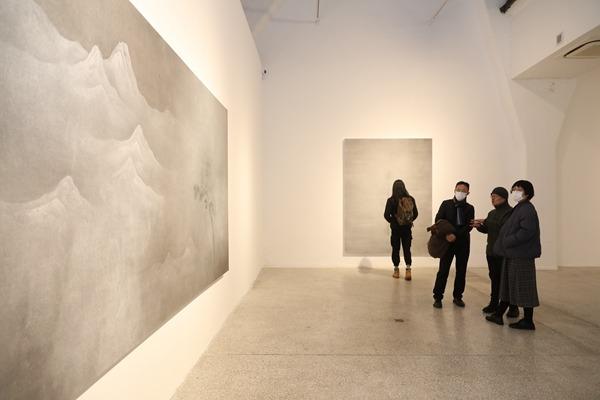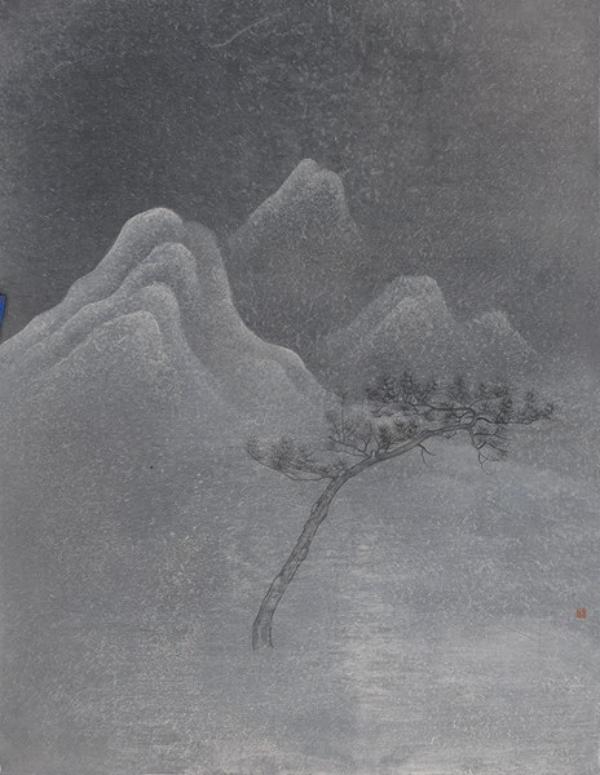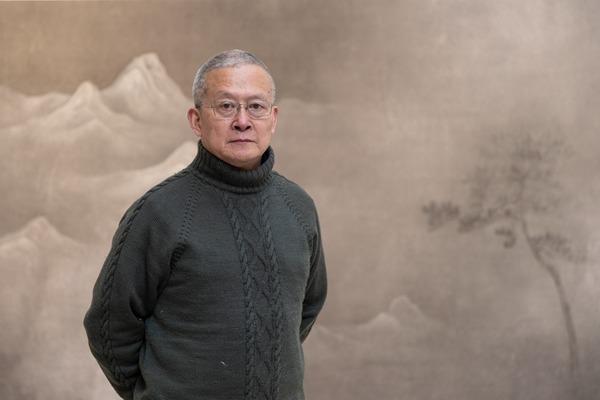 Ink painter Zhu Jianzhong's solo show in Beijing's 798 Art Zone attracts viewers. The show features some of the works produced by the 67-year-old over the last two years. (PHOTO PROVIDED TO CHINA DAILY)
Ink painter Zhu Jianzhong's solo show in Beijing's 798 Art Zone attracts viewers. The show features some of the works produced by the 67-year-old over the last two years. (PHOTO PROVIDED TO CHINA DAILY)
It's difficult enough for artists to create a recognizable image worthy of appreciation. How much more difficult, then, for an artist to explore "nothingness"? With the paintings, the artist seems to try to lead the viewers into the abyss of the unknown, into the void.
To be a good ink painter, one normally starts to hone their skills as a child, read plenty of books, study the work of old masters and learn by copying their style
For decades, ink painter Zhu Jianzhong has dedicated himself to such an exploration. He has sought to translate his understanding of that concept, which he views as "a spiritual cultivation".
Zhu, 67, has an ongoing show at the Tokyo Gallery + Beijing Tokyo Art Projects in the Chinese capital, where his ink works, made between 2018 and 2020, are on display.
His technique involves layering ink on paper to form different shades of black and gray to finally reach his goal-drawing or suggesting the "nothingness" that logically, of course, does not exist.
"Nothingness on canvas can be seen as empty space. But it exists in Chinese ink painting as a kind of intimation of the air between earth and sky," says Zhu, who tries to paint the "air" out.
ALSO READ: Making an impression
When Zhu starts a painting, he never thinks about how it will look. He is setting out on an adventure, a trek into the unknown. His ink and water layering, centimeter by centimeter, can end up being several meters long. The one certainty is that the route and destination are unpredictable.
"If life is planned and scheduled, it's boring. The most interesting thing in life is that it's unpredictable. So are my paintings," the artist tells China Daily.
It's often suggested that, in Chinese ink painting, one should have the picture in mind before using the brush to paint. However, Zhu's way of painting eschews such tradition-he has no idea where his brush will take his hand when putting it to rice paper. He leaves it to intuition, fate and a sense that it will be all right on the night.
This approach may be attributed to his early experiences.
 Inside the Cloudsis a typical piece of ink painter Zhu's works on display. (PHOTO PROVIDED TO CHINA DAILY)
Inside the Cloudsis a typical piece of ink painter Zhu's works on display. (PHOTO PROVIDED TO CHINA DAILY)
When Zhu went to the Nanjing University of the Arts in Jiangsu province at the age of 24, he had little knowledge of Chinese ink painting. Before going to college, he had been a worker in a chemical factory for six years. His only art experience, and to describe it that way involves a great deal of exaggeration, was regularly painting a blackboard in the factory.
To be a good ink painter, one normally starts to hone their skills as a child, read plenty of books, study the work of old masters and learn by copying their style.
Zhu says his family couldn't support his ink painting dream when he was a small boy. He also had no access to examine the works of the masters. After he went to college, he selected a group of Chinese ink masters to study and developed his own style gradually.
The artist goes to his studio in a suburb in Nantong, Jiangsu province, almost every day, to practice with ink. His work demands that most precious commodity: Time.
Nor is his work a smooth line of progression. Adjustments are carried out regularly. A sudden emotion or idea coming to his mind will demand immediate attention and a new approach to the painting.
Chen Xiaoxin, an art critic and an old friend of Zhu, says he's one of the few ink painters who paints just for the act itself, rather than for fame and wealth.
"He's a man of few words, lives far away from the social centers and immerses himself in his own world of art," Chen says.
In many of Zhu's works, there is a single tree surrounded by the nothingness he created. This tree often intrigues viewers and they offer their interpretations. For instance, they see the tree as a sign of loneliness or a symbol to represent the artist's personality.
READ MORE: Feeding the imagination
 This undated photo shows ink painter Zhu Jianzhong. (PHOTO PROVIDED TO CHINA DAILY)
This undated photo shows ink painter Zhu Jianzhong. (PHOTO PROVIDED TO CHINA DAILY)
Zhu says there's no special meaning for the tree in the "nothingness".If he feels there should be a tree, he will follow his instincts and paint one. And what kind of tree? It can be a pine tree or a dawn redwood, both of which are a usual sight in the city in which he lives.
"I never make a plan about my life, just like I never know what my next piece will look like," he says, adding that uncertainties in life bring about creativity.


